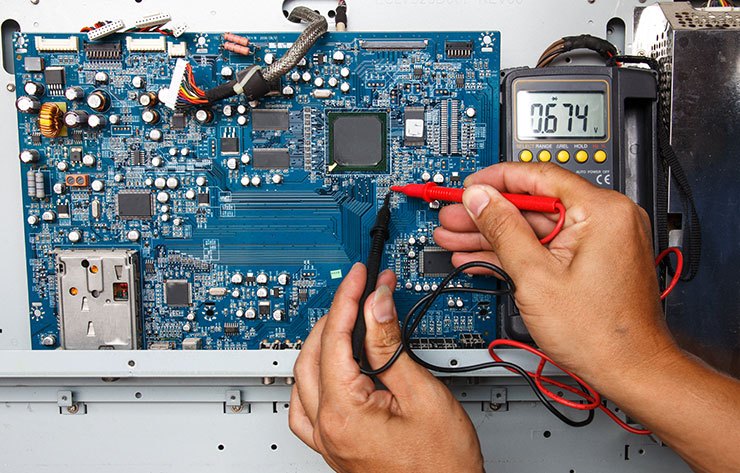What is an Instrumentation Engineer?
Instrumentation Engineers are responsible for planning, installing, monitoring and maintaining control systems and machinery within manufacturing environments. They typically work with control processes that use sensors to provide feedback. As a result, that can also have a role in designing and developing customer products that utilize such processes, such as blood glucose meters or smoke detectors.
What is Instrumentation Engineering?
Instrumentation engineering focuses on control processes that use sensors as an input.
This field of engineering can be concerned with equipment processes using sensors to observe many types of variables including pressure, pH, voltage, temperature and many more.
Feedback from such sensors can be used throughout the manufacturing process. They can measure and monitor things such as specific machine outputs, the efficiency of systems and, most importantly, safety parameters. They can also play an extremely important part in the monitoring and recording of quality data to ensure the safety and reliability of the final product.
In addition to simply monitoring, the feedback given from these systems and processes can be fed back into the system to alter and control the manufacturing process – optimizing efficiency and safety.
The ultimate aim of instrumentation engineering is to ensure that control machinery and processes are working to achieve maximum productivity in an optimally efficient, safe and reliable manner.
What Does an Instrumentation Engineer do?
An instrumentation engineer could be responsible for any part of the lifecycle of a control process. They can be tasked with planning, design, development, and installation of a new process. They could also monitor, maintain and manage teams responsible for control systems already in place.
While the specific tasks of any given instrumentation engineering job will depend upon the control systems involved and the end product being created, tasks might include:
- Working with stakeholders to design and develop new control processes
- May involve procurement and budgetary responsibility
- Installation of new control processes
- Development of instrumentation testing protocols
- Daily monitoring of sensor outputs and process operation
- Ensuring instrumentation operation complies with quality parameters
- Carrying out routine/planned maintenance
- Troubleshooting any issues or concerns
- Optimisation of processes to improve system efficiency
- Data collection and analysis
- Report writing
- Supervision of instrumentation technicians and other junior team members
- Training production staff if required
How Do You Become an Instrumentation Engineer?
Individuals looking to become instrumentation engineers will typically have a BSc in an engineering discipline such as electrical engineering, electronic engineering, automation engineering or similar disciplines. It may rarely be possible to move into this role after a significant experience of junior/technician roles with an instrumentation team.
Instrumentation Engineers in Pharma
If you already are working as an instrumentation engineer and wish to retrain to work in the same job within the pharmaceutical or medical device manufacturing industry, check out out GMP Training for Beginners program to learn about the Good Manufacturing Practices (GMPs) and the risk management techniques used in a regulated manufacturing environment.
If you want to move into roles in the pharmaceutical or medical device industry to roles that include managing GxP computerised systems, check our Computer System Validation Course for regulated industries. This program will show you how to manage electronic data in a regulated manufacturing/laboratory/clinical environment in compliance with FDA’s 21 CFR Part 11 or other regulatory guidelines using the GAMP framework.
What Skills Do I Need?
There is a wide range of skills necessary to becoming a successful Instrumentation Engineer. These include:
- Communication – need strong verbal communication skills to work within wider manufacturing team as well as written communication skills for activities such as report compilation and writing training documents
- Team working – instrumentation engineers are required to work closely with people across many different departments and at all levels
- Attention to detail – even small deviations from expected system performance have to be noted and acted upon
- Problem-solving skills – the role can require individuals to assess problems and come up with new and innovative solutions
- Organisational skills – must be able to prioritize tasks and perform duties to minimize manufacturing downtime and meet deadlines
- Curiosity – genuine interest in keeping up with new technologies is advantageous
Instrumentation Engineer Salaries & Job Growth
Check out our salary guide for Instrumentation Engineer salary information local to you.
Instrumentation Engineer Resume Tips
As with all resumes, it’s extremely important that you tailor your Instrumentation Engineer resume to reflect the language used within the job advert. Where you have relevant experience or skills, use the words and phrases that the employer has used to describe them. Do not assume that someone will read similar wording and know what you mean.
Instrumentation Engineer roles will typically be looking for the skills previously outlined:
- Communication
- Team working
- Attention to detail
- Problem-solving skills
- Organisational skills
- Curiosity
For more help with your resume, check out these templates and this list of 30 tips to improve your resume.
Instrumentation Engineer Job Vacancies
For a list of currently available pharmaceutical Instrumentation Engineering roles, head over to our jobs boards and select Engineering in the “Jobs by Category” menu. We currently have job boards for Ireland and the UK.
23 Other Types of Pharma Job Roles
Manufacturing/Production
- Process Technician
- Process Operator
- Manufacturing Technician
- Packaging Operator
- Production Supervisor
Engineering
Maintenance
Quality
Science/Laboratory
Validation
Our Most Popular Programs and Courses
- Equipment Validation Training Course – for Starter Validation, CQV and C&Q Roles
- Pharmaceutical Validation Training Course – for more Senior Validation, CQV and C&Q Roles
- Computer System Validation Training Course
- GMP Training for Beginners in the Pharmaceutical Industry
- View All 13 Pharmaceutical Courses
About the Author
Donagh Fitzgerald
Head of Marketing & Product Development
Mechanical/Production Engineer
Donagh looks after the marketing and product development including the training and pedagogical elements of our programs and makes sure that all GetReskilled’s users can have a great online learning experience. Donagh has lived and worked in many countries including Ireland, America, the UK, Singapore, Hong Kong and Japan. Donagh has also served as the Program Manager for the Farmleigh Fellowship based out of Singapore.
Donagh holds Degrees in Production Engineering and Mechanical Engineering from South East Technological University, Ireland.
Claire Wilson
Content Marketing and Career Coaching
Claire runs GetReskilled’s Advanced Career Coaching Programme – our specially devised job hunting course that helps our trainees take that final step into employment by leading them through the job hunting process. She is extremely enthusiastic about helping people reach their final goal of employment in their new career path.
Claire has a BSc (Hons) in Medical Biology from Edinburgh University and spent 7 years working in the pharmaceutical and medical device industries.



I was doing civil engineering and now I want to do instrumentation engineering.
What is required of my matric result to work as instrumentation engineer ,
Hi Napogadi,
Not sure I follow your question. It seems like you are asking what your minimum test score needs to be to work as an instrumentation engineer. If that is the case, then what you are studying in university is far more relevant.
Generally speaking, people who become instrumentation engineers will typically have a BSc in an engineering discipline such as electrical engineering, electronic engineering, automation engineering or similar disciplines. It may be possible to move into this role after a significant experience of junior/technician roles with an instrumentation team. In addition, qualified elections may also move into this role.
Hi Donagh,
I would be interested in the instrumentation course.
I have a national certificate in Electronic Engineering and a National Diploma in Industrial Automation. I am also a qualified Electrician.
I have not gained much practical experience in Electronics or Automation.
The function of the course would be to upskill and get full time employment. I am not working at the moment and I am on jobseekers benefit.
So I’m just wondering what the cost of such a course would be for instrumentation and would it be online or blended.
I would be grateful if you could get back to me on this.
Thank you,
Kind regards
Padraig McGovern
Leitrim